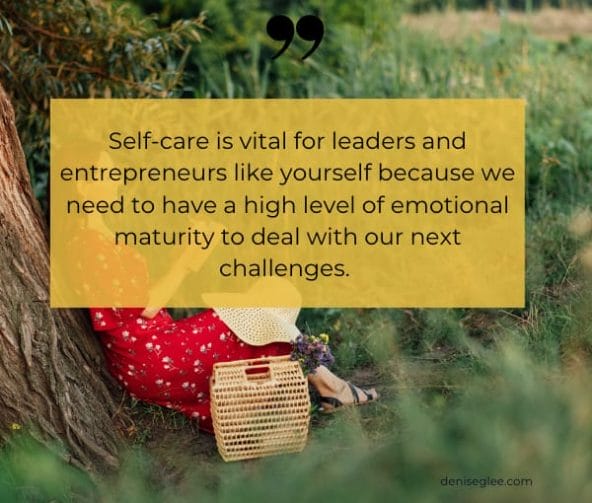
Self-Care Tips for Leaders, Caregivers and Entrepreneurs
As a life coach for businesses, I am super into leaders like you. And why? Because I know that many people depend on you. You provide your clients and team members with calm, stability, and a sense of purpose. Unfortunately, all this responsibility can lead you to feel depleted, exhausted, and tired.
If not monitored, the weight of all your tasks will lead to stress, anxiety, as well as exhaustion. Before you reach burnout, you need to schedule adequate time for rest and self-care into your day. In this article, we will discuss self-care tips for leaders, caregivers, and entrepreneurs.

Before we discuss my recommended self-care tips, you need to understand why you may hesitate to ask for help. This is important so that you prevent yourself from slipping to familiar, yet unhealthy habits in the future.
Why is it hard to ask for help?
Overlapping Commitments
We have worked so hard to support others that some how along the way we forgot how to receive emotional, physical and spiritual support. This may be due to overlapping commitments and priorities. If you feel as if you have too much to do and too little time, now is the time to prioritize the important from the urgent.
With so many commitments, it is hard to cultivate rest and relaxation in your regulate routine. In the podcast link below, I talk about how to create the space so that you can be able to add more fun and joy in your life.
The fear of looking bad.
Nobody wants to admit they are struggling with an issue. This is especially true if you spend your days being viewed as a problem solving, do-it-all with no frustration, miracle worker. Another reason why you resist looking for help is because the intense shame of past mistakes.
However, if you want to improve your overall health and wellness, this requires admitting your current situation and seek self-care. Self-care means that you are honest and vulnerable with others. This is a difficult task if you were raised to be perfect, try hard, be strong and never complain.
Seeking support is a sign of strength
Yes, showing your ongoing need for support is a sign of strength, not weakness. Mental health researcher and LCSW Brené Brown, has admitted that although she is recovering alcoholic (23 years and counting!), she still needs help to address her unresolved emotional issue.
If you want to grow your business and improve the quality of your life, you must be ready to share the good, bad and ugly side of your life. Nobody can help you if they don’t know anything wrong.
You don’t see it as a problem
Practical Self-Care Tips For Entrepreneurs, Leaders & Caregivers
There are too many website that tell you to improve your diet, schedule time to exercise and spend time with your friends and family members. And while those tips are needed and useful, there are other things to consider. Let’s talk about signals that show something you need to attend the needs of your body, mind or soul.
Signals that the body and/or mind needs time to rest
Most people are triggered by the lack of basic needs such as being hungry, angry, lonely or tired, known simply as HALT. The HALT principle is taught in twelve step programs like AA which is used to prevent relapse. When you experience one or more HALT feelings, there is a biological, psychological or mental need that must be addressed.
Addressing your needs before you arrive at crisis
- When was the last time you:
- Took a break?
- Ate something nutritious and healthy?
- Exercised or did something to strengthen, lengthen or challenged the body?
- Spent time in nature?
- Talked with someone who made you laugh or smile?
- Visited a community event or religious activity which gives you joy?
- Are you well-hydrated?
- Are you drinking enough water during the day?
- Are you drinking too much alcohol?
- Do you have stiffness because you are sitting too long in a chair or are you experiencing any pain or discomfort anywhere in the body?
- Can you take something or do something to alleviate that doesn’t involve pills to alleviate the pain?
- If you are feeling stressed:
- Can you remove yourself from the environment temporarily?
- Who is most appropriate to help you in this situation?
- How can you minimize or avoid future problems?
Be honest with yourself and your community
Now is the time to be honest with others. If being honest with others feels difficult, below are some questions to assist you in improving the quality of relationships with others in your life:
- Who in your world shows interest in your issues and well-being?
- How much time do you need to spend each week with (insert name of loved one)?
- How can you show others that that you are more than just your title?
- Are you being open with others about your shortcomings, difficulties and setbacks?
- Are you willing to accept constructive criticism or advice from others?
Closing Thoughts
The best leaders are those who can communicate their needs to others and also more importantly, to themselves. Show your community that you can regulate your emotions, find healthy ways to banish stress and communicate your needs with others.
Self-care is vital for leaders and entrepreneurs like yourself if you want to grow and scale your business. Now is the time to banish this idea that you must not ask or receive help. Do not hesitate reaching out to me if you need help.






Add A Comment
You must be logged in to post a comment.